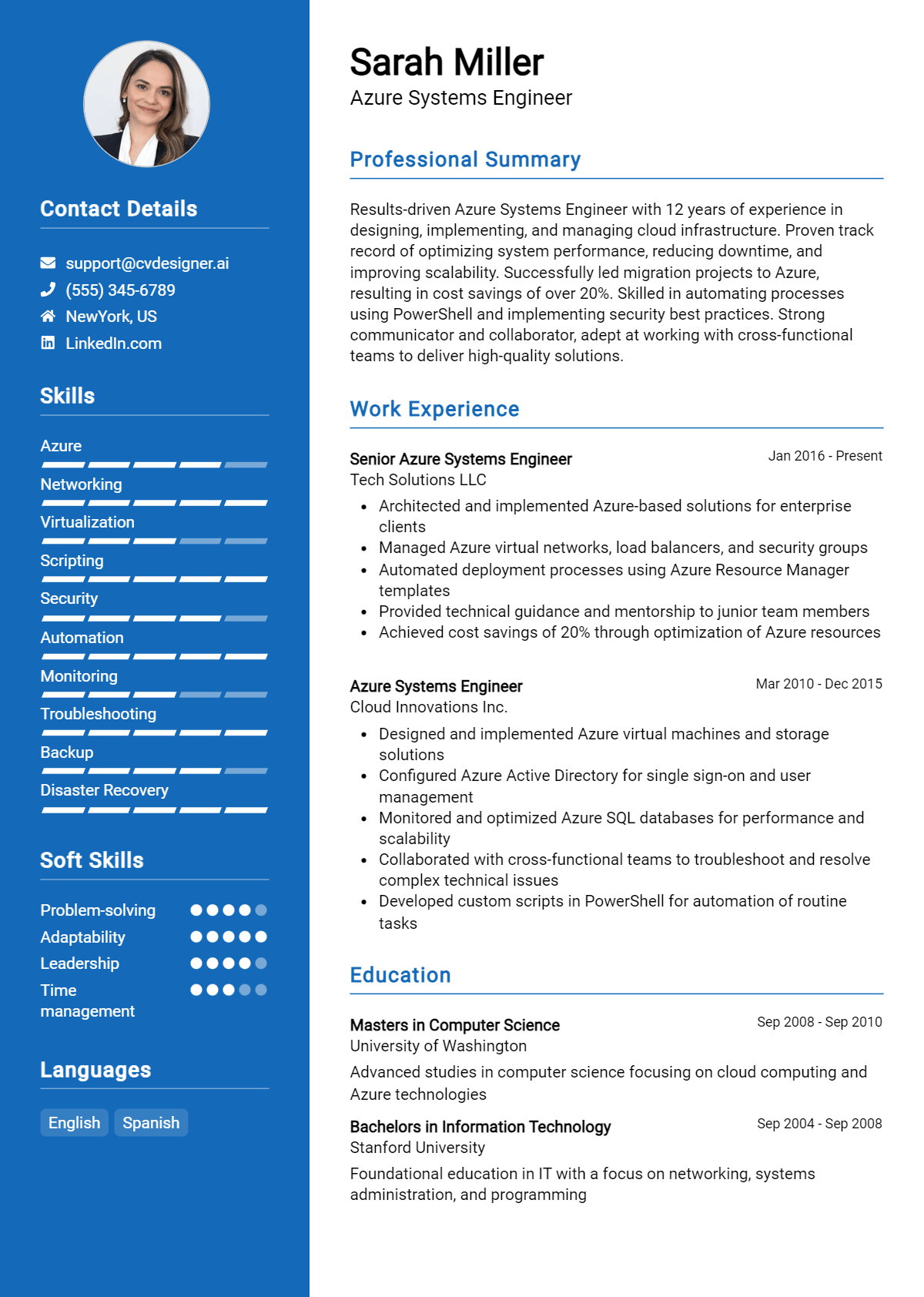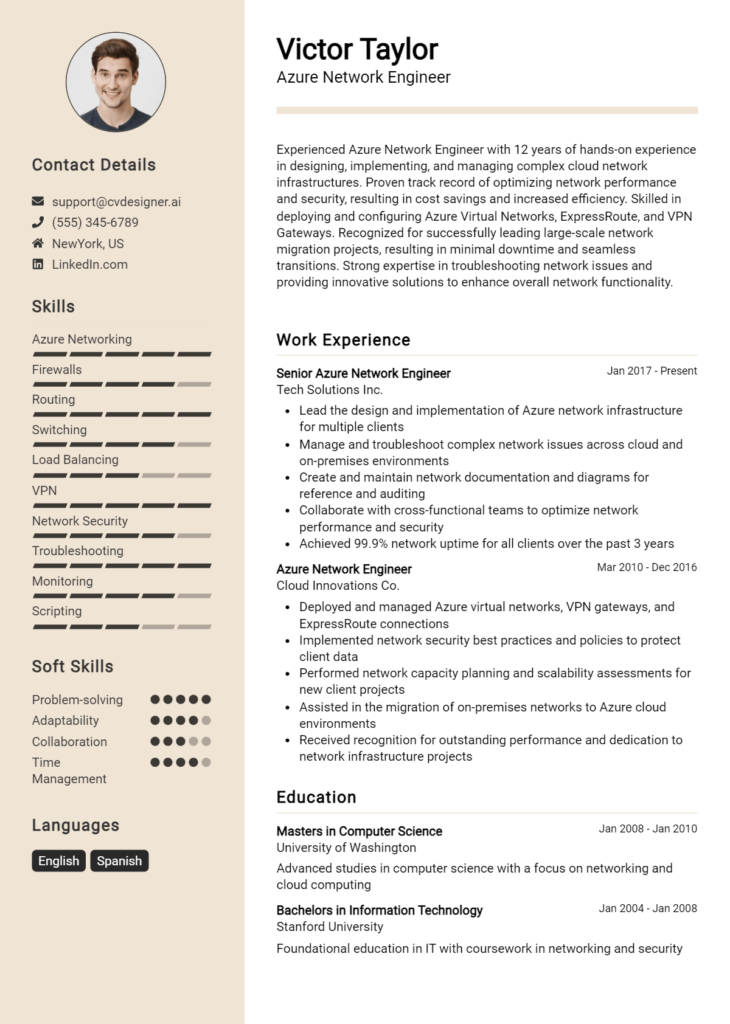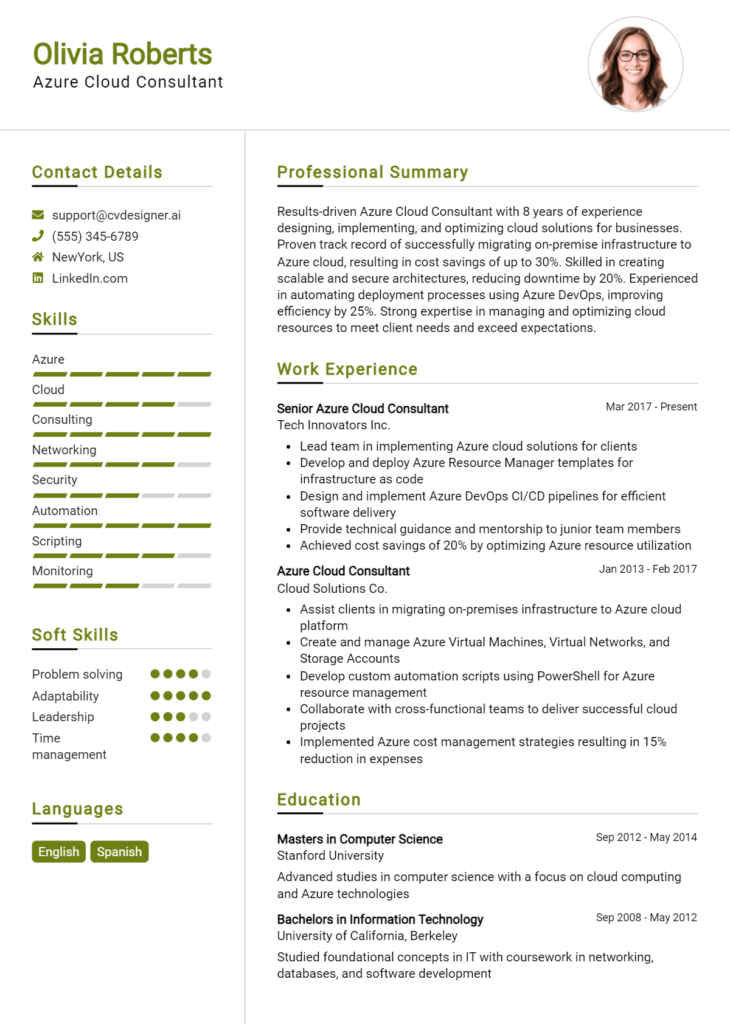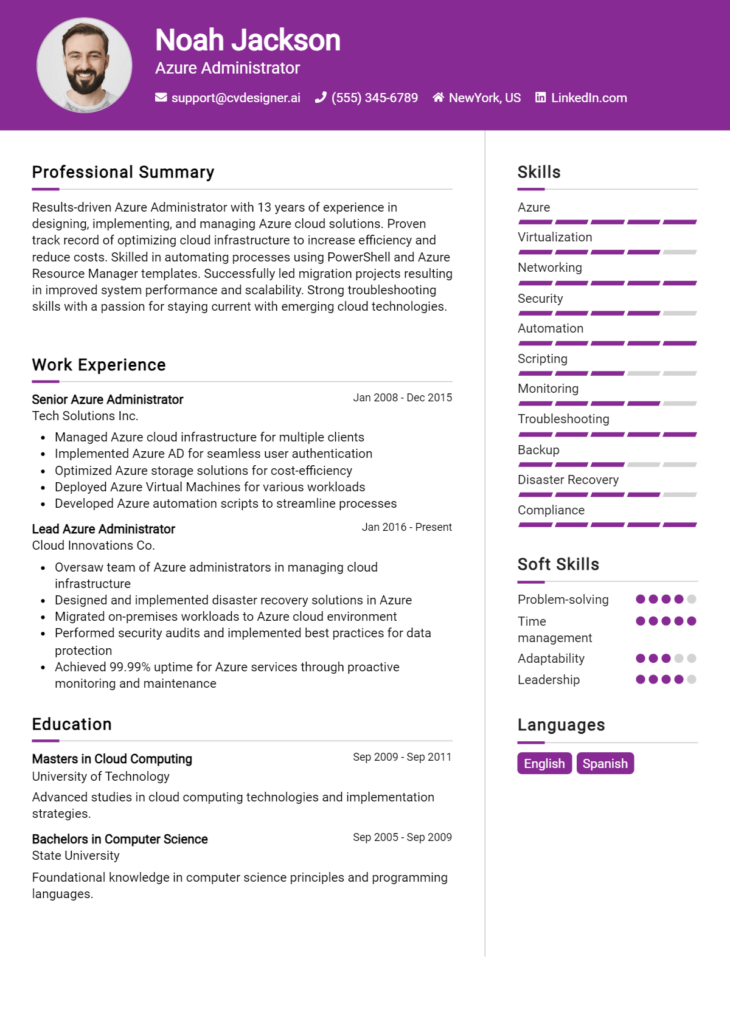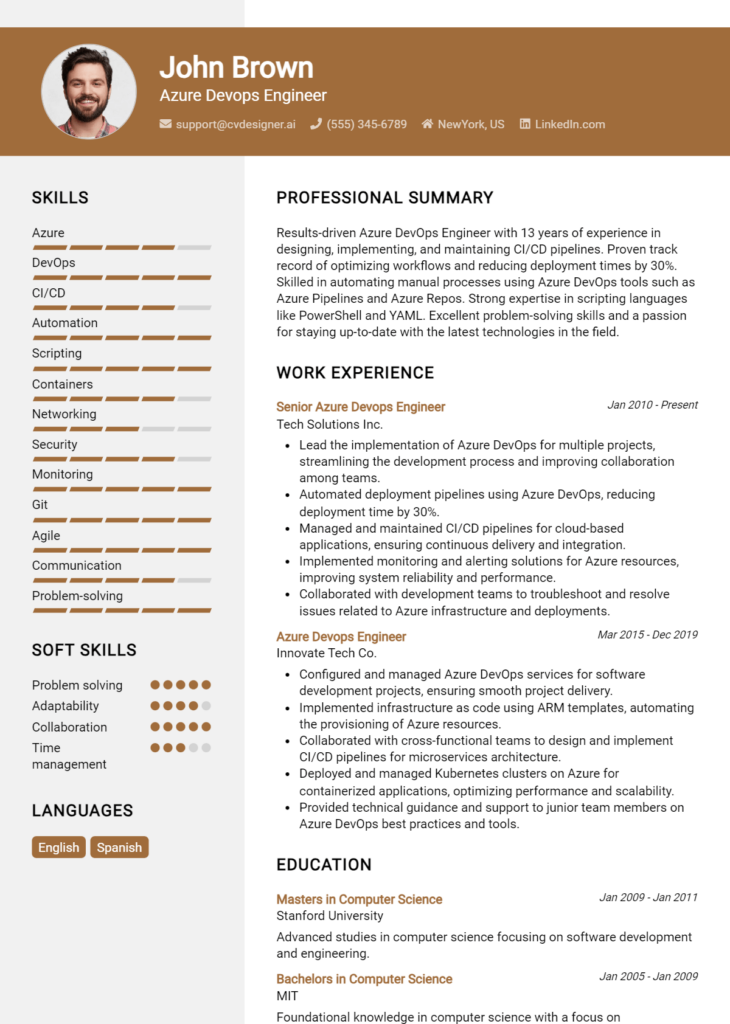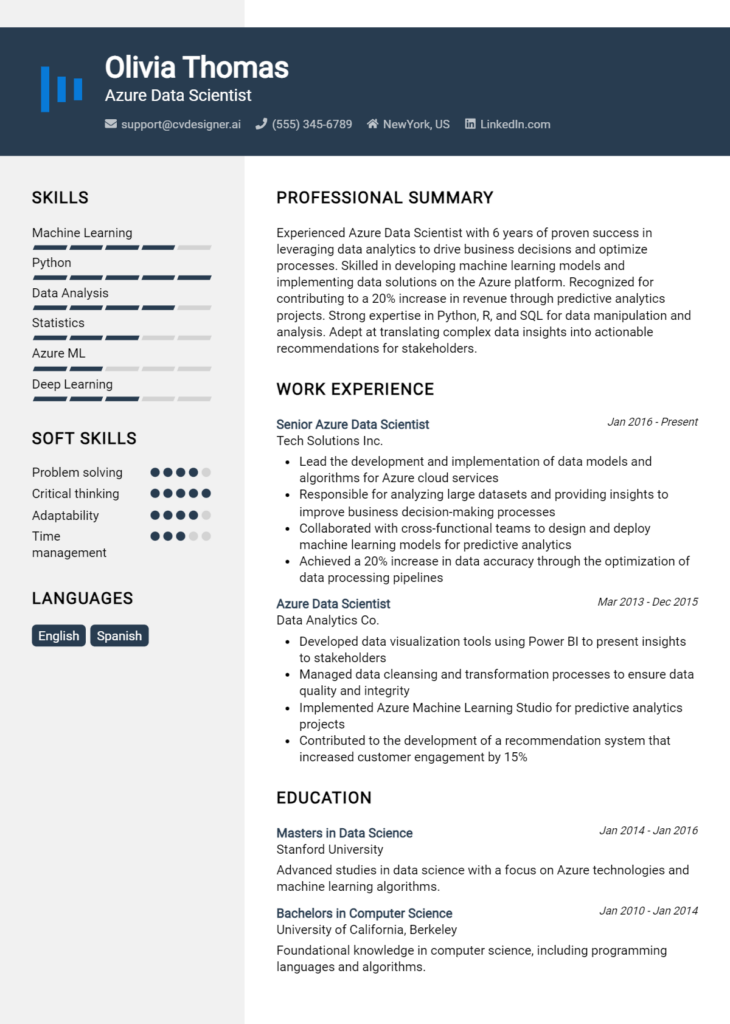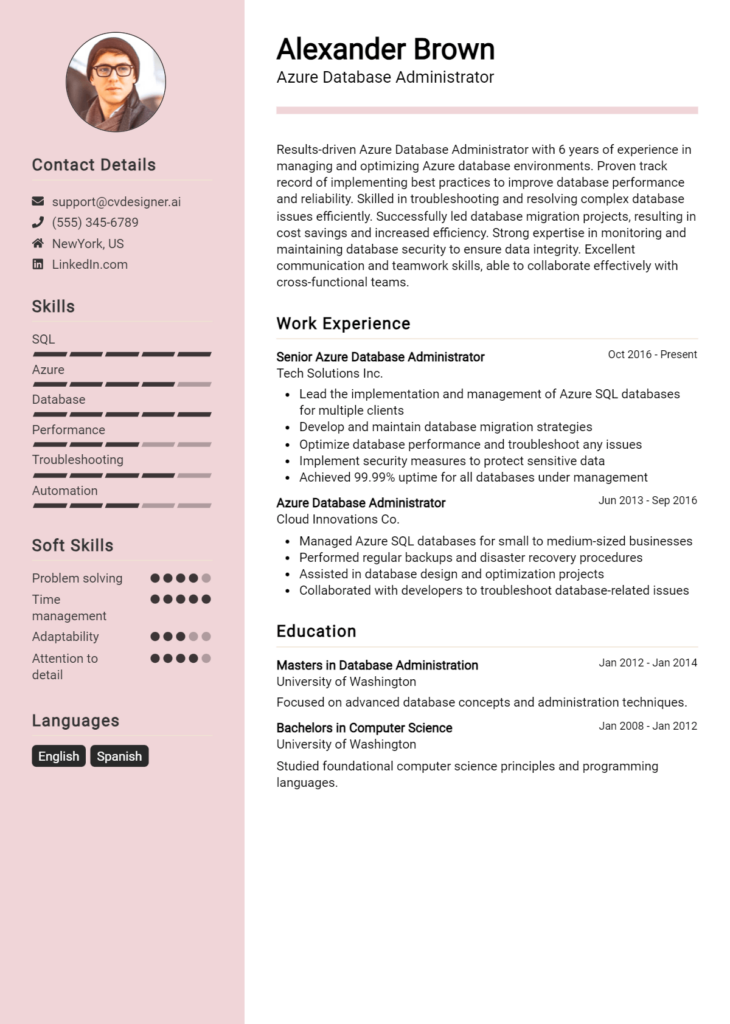Most Popular Azure Systems Engineer Resume Examples
Explore additional Azure Systems Engineer resume samples and guides and see what works for your level of experience or role.
As organizations increasingly migrate to the cloud, the role of an Azure Systems Engineer has become vital in ensuring that systems are optimized, secure, and efficient. This position not only requires technical expertise but also a strategic mindset to align IT infrastructure with business goals. A well-crafted resume is your first step to standing out in this competitive field; it serves as your personal marketing tool, showcasing your skills and experiences to potential employers. In this comprehensive guide, we will delve into the nuances of writing a resume specifically tailored for the Azure Systems Engineer role, equipping you with the insights needed for a successful job application.
Throughout this article, we will cover several key points to help you craft an exceptional resume. You'll learn about the core responsibilities and essential skills that employers are looking for in an Azure Systems Engineer. We’ll discuss the best formats to use, ensuring that your resume is not only visually appealing but also easy to read. Common mistakes that could jeopardize your chances of landing an interview will be highlighted, allowing you to avoid pitfalls that many candidates encounter. Additionally, we’ll provide resume examples suitable for all experience levels, from entry-level to senior roles. Finally, you’ll find valuable tips on effective resume writing and advice on selecting the right resume templates that can elevate your presentation. Whether you're a seasoned professional or just starting, this guide will empower you to create a standout resume that captures the attention of hiring managers.
Key Responsibilities and Skills for a Azure Systems Engineer
As an Azure Systems Engineer, you play a crucial role in managing and optimizing cloud infrastructure, ensuring that systems operate efficiently and securely. Your responsibilities will often include designing, implementing, and maintaining Azure solutions, as well as troubleshooting and resolving any issues that arise. You will also collaborate with development and operations teams to enhance application performance and scalability, while ensuring compliance with best practices and security standards.
Key Responsibilities:
- Design, deploy, and manage Azure cloud solutions.
- Monitor system performance and troubleshoot issues to ensure optimal operations.
- Implement security measures and ensure compliance with industry standards.
- Collaborate with cross-functional teams to develop and deploy applications.
- Automate processes using scripting and Azure DevOps tools.
- Conduct regular system audits and performance tuning.
- Provide technical support and training to end-users.
Essential Skills:
- Proficiency in Azure services (e.g., Azure Virtual Machines, Azure Active Directory).
- Strong understanding of networking concepts and protocols.
- Experience with scripting languages (e.g., PowerShell, Python).
- Familiarity with DevOps practices and tools (e.g., Azure DevOps, CI/CD pipelines).
- Knowledge of security best practices in cloud environments.
- Problem-solving and analytical skills.
- Excellent communication and collaboration abilities.
Highlighting these skills effectively in the resume skills section is crucial for making a strong impression on potential employers. Tailoring your responsibilities and skills to match the job description can significantly increase your chances of landing an interview. Additionally, consider how these skills reflect on your overall CV, showcasing your qualifications and aligning them with what hiring managers are seeking. A well-crafted CV that emphasizes your relevant experience and expertise in Azure systems engineering will set you apart in a competitive job market.
Best Resume Format and Structure for a Azure Systems Engineer
When crafting a resume for an Azure Systems Engineer position, choosing the right format and structure is crucial to effectively highlight your qualifications and experiences. Below is a detailed guide on the best resume format and sections to include.
Contact Information
- Include your full name, phone number, email address, and LinkedIn profile.
- If applicable, add your GitHub or personal website where you showcase your projects or contributions related to Azure and systems engineering.
Professional Summary
- Write a brief 2-3 sentence summary that highlights your experience, skills, and what you can bring to the role.
- Focus on your expertise in Azure technologies, cloud solutions, and systems engineering, while mentioning any specific achievements or certifications that set you apart.
Work Experience
- List your work experience in reverse chronological order, starting with your most recent job.
- For each position, include the job title, company name, location, and dates of employment.
- Use bullet points to describe your responsibilities, achievements, and the technologies you worked with.
- Focus on quantifiable results (e.g., "Implemented Azure solutions that improved system uptime by 30%").
- Highlight experience with Azure services, cloud migrations, and system architecture design.
Education
- Include your highest degree first, listing the degree title, institution name, location, and graduation date.
- If you have relevant coursework or projects, especially those related to cloud computing, consider including them.
Skills
- Create a section that lists your technical skills relevant to the Azure Systems Engineer role.
- Include both hard skills (e.g., Azure DevOps, PowerShell, networking, system architecture) and soft skills (e.g., problem-solving, teamwork, communication).
- Tailor this section to match the job description, using keywords that align with the role.
Certifications
- List any relevant certifications that demonstrate your expertise in Azure and systems engineering.
- Examples include Microsoft Certified: Azure Solutions Architect Expert, Azure Administrator Associate, and any other cloud-related certifications.
- Include the date obtained and the certifying body.
Tips for Choosing the Right Resume Format
- A chronological resume format is often the best choice for Azure Systems Engineers, as it allows you to showcase your career progression clearly.
- Ensure your resume is clean, well-organized, and easy to read. Use clear headings, bullet points, and consistent formatting.
- Keep your resume to one or two pages, focusing on the most relevant information for the job you are applying for.
Complementing Your Cover Letter
- The resume format can complement your cover letter format by maintaining consistency in design, font, and style.
- Make sure your cover letter also includes a professional header with your contact information and is structured similarly to your resume, making it visually cohesive.
- Use the cover letter to expand on specific experiences mentioned in your resume, providing context and demonstrating your enthusiasm for the role.
By following this guide, you will create a compelling resume that effectively showcases your qualifications as an Azure Systems Engineer, making a strong impression on prospective employers.
Writing Tips and Best Practices for a Azure Systems Engineer Resume
When crafting a resume as an Azure Systems Engineer, it's essential to present your skills and experiences in a clear and impactful manner. Start by tailoring your resume to highlight relevant technical competencies and achievements within Azure environments. Utilize a clean format that enhances readability, ensuring your qualifications stand out to hiring managers. Remember, your resume is a marketing tool that should showcase not just what you’ve done, but how well you’ve done it. To elevate your resume, consider the following tips:
- Use strong action verbs such as "implemented," "designed," "automated," and "optimized" to convey your contributions effectively.
- Quantify your achievements wherever possible—include metrics like project completion times, cost savings, or system uptimes to demonstrate your impact.
- Incorporate industry-specific keywords related to Azure and systems engineering, as this can help your resume pass through applicant tracking systems (ATS).
- Highlight relevant certifications such as Azure Administrator, Azure Solutions Architect, or others, and place them prominently to catch the eye of recruiters.
- Focus on your problem-solving skills by detailing specific challenges you faced and how you overcame them using Azure technologies.
- Tailor your resume for each job application by aligning your skills and experiences with the job description.
- Keep your resume concise, ideally one page, and ensure it is free from spelling and grammatical errors, maintaining a professional tone throughout.
Utilizing resume writing tips can enhance the overall presentation of your resume, making it more appealing to potential employers. Additionally, remember that these best practices are equally applicable when drafting a cover letter, where you can further elaborate on your qualifications and passion for the role.
Common Mistakes to Avoid in a Azure Systems Engineer Resume
Crafting a compelling resume as an Azure Systems Engineer requires careful attention to detail and a strategic approach to presenting your skills and experience. Many candidates make common mistakes that can undermine their chances of landing an interview. By being aware of these pitfalls, you can create a more effective resume that highlights your qualifications and aligns with the expectations of potential employers. Here are some common mistakes to avoid:
- Overloading your resume with excessive information that can overwhelm the reader.
- Using generic descriptions that fail to highlight your specific accomplishments and contributions.
- Focusing too much on job duties rather than showcasing your impact and results.
- Neglecting to tailor your resume for each application, leading to a lack of relevance.
- Ignoring the importance of formatting and readability, making it difficult for recruiters to navigate.
- Failing to quantify achievements, which can obscure the significance of your contributions.
- Not including relevant keywords that align with job descriptions, risking your resume being filtered out by applicant tracking systems.
- Using an unprofessional email address or outdated contact information.
- Omitting important certifications or skills relevant to Azure technologies.
- Overlooking proofreading for typos and grammatical errors, which can reflect poorly on your professionalism.
To avoid these mistakes and enhance your resume, consider reviewing the common mistakes to avoid in a resume. Additionally, it's crucial to pay attention to your cover letter as well, so be sure to check out the common cover letter mistakes to ensure your application stands out for all the right reasons.
Sample Azure Systems Engineer Resumes
As the demand for cloud computing continues to surge, the role of an Azure Systems Engineer has become increasingly vital in organizations worldwide. This position requires a blend of technical expertise in Microsoft Azure services, system administration skills, and a strong understanding of networking principles. Below are three sample resumes tailored for different stages of an Azure Systems Engineer career: an experienced professional, an entry-level candidate, and a career changer. Each example highlights relevant skills, experience, and education to effectively demonstrate the candidate's qualifications for the role.
Sample Resume 1: Experienced Azure Systems Engineer
John Doe
123 Cloud Lane
Seattle, WA 98101
(555) 123-4567
johndoe@email.com
Professional Summary
Results-driven Azure Systems Engineer with over 8 years of experience in designing, implementing, and managing Microsoft Azure environments. Proven expertise in optimizing cloud applications, ensuring high availability, and enhancing system performance. Strong collaborator with excellent problem-solving skills and a commitment to continuous improvement.
Technical Skills
- Microsoft Azure (IaaS, PaaS, SaaS)
- Azure DevOps & CI/CD Pipelines
- Windows Server & Active Directory
- Networking (TCP/IP, DNS, VPN)
- PowerShell & Azure CLI
- System Monitoring & Performance Tuning
Professional Experience
Senior Azure Systems Engineer
ABC Tech Solutions, Seattle, WA
June 2018 – Present
- Designed and deployed scalable Azure solutions that reduced operational costs by 30%.
- Led a team of engineers to migrate on-premises applications to Azure, ensuring minimal downtime and high availability.
- Implemented Azure DevOps practices to streamline deployment processes, resulting in a 50% reduction in deployment time.
Azure Systems Engineer
XYZ Corporation, Seattle, WA
May 2015 – May 2018
- Managed Azure subscriptions and resources, including virtual machines, storage accounts, and networks.
- Developed automation scripts using PowerShell to enhance system efficiency and reliability.
- Provided technical support for Azure-related incidents, achieving a 95% resolution rate on first contact.
Education
Bachelor of Science in Computer Science
University of Washington, Seattle, WA
Graduated: May 2015
Sample Resume 2: Entry-Level Azure Systems Engineer
Jane Smith
456 Cloud Ave
Dallas, TX 75201
(555) 987-6543
janesmith@email.com
Professional Summary
Motivated and detail-oriented recent graduate with a Bachelor’s degree in Information Technology. Eager to leverage foundational knowledge of Microsoft Azure and cloud computing to support IT operations as an Azure Systems Engineer. Possesses strong analytical skills and a commitment to quality.
Technical Skills
- Microsoft Azure Fundamentals
- Virtualization Technologies
- Windows Server Administration
- Basic Networking Concepts
- Scripting (PowerShell)
- Problem Solving
Education
Bachelor of Science in Information Technology
University of Texas, Dallas, TX
Graduated: May 2023
Internship Experience
Cloud Support Intern
Tech Innovations, Dallas, TX
January 2023 – May 2023
- Assisted in the deployment and configuration of Azure resources under the guidance of senior engineers.
- Conducted system monitoring and reported performance metrics, contributing to optimization efforts.
- Participated in troubleshooting sessions, gaining hands-on experience with Azure support tools.
Projects
- Developed a personal project to deploy a web application on Azure, using Azure App Services and SQL Database.
Sample Resume 3: Career Changer to Azure Systems Engineer
Michael Johnson
789 Tech Blvd
San Francisco, CA 94103
(555) 321-8765
michaeljohnson@email.com
Professional Summary
Dynamic IT professional with 5 years of experience in network administration and a passion for cloud technologies. Eager to transition into an Azure Systems Engineer role, leveraging strong foundational skills in IT support and system management, coupled with recent Azure training.
Technical Skills
- Network Administration & Troubleshooting
- Microsoft Azure (Fundamentals and Architecture)
- Virtualization (VMware, Hyper-V)
- System Security and Compliance
- Scripting Languages (Bash, PowerShell)
- Analytical Problem Solving
Professional Experience
Network Administrator
Global Networks Inc., San Francisco, CA
August 2018 – Present
- Managed network infrastructure, ensuring optimal performance and security for over 200 users.
- Collaborated with IT teams to support the rollout of cloud-based applications and services.
- Provided end-user support, resolving technical issues and improving user satisfaction by 20%.
IT Support Specialist
Tech Solutions LLC, San Francisco, CA
June 2016 – July 2018
- Delivered technical support for hardware and software issues, demonstrating strong problem-solving skills.
- Assisted in the implementation of new IT systems and infrastructure upgrades.
- Developed documentation and training materials for end-users on cloud services.
Education & Certifications
- Microsoft Certified: Azure Fundamentals (2023)
- Associate Degree in Information Technology
City College of San Francisco, San Francisco, CA
Graduated: May 2016
For more inspiration, explore additional resume examples tailored to various job roles. Don’t forget that corresponding cover letter examples can further enhance your job application package.
Checklist for a Azure Systems Engineer Resume
- Proofread for Errors: Carefully review your resume for spelling, grammar, and punctuation mistakes. Consider using tools like Grammarly or having a peer review it.
- Consistent Formatting: Ensure that font types, sizes, and styles (bold, italics) are used consistently throughout your resume. Uniformity in bullet points and spacing enhances readability.
- Tailor for the Job: Customize your resume to align with the specific job description. Highlight relevant skills and experiences that match the requirements of the Azure Systems Engineer role.
- Clear Objective Statement: Include a concise and targeted objective statement that clearly states your career goals and how they align with the prospective employer's needs.
- Highlight Key Skills: List technical skills relevant to Azure, such as Azure DevOps, cloud architecture, and security best practices. Ensure these are prominently featured.
- Quantify Achievements: Whenever possible, quantify your accomplishments (e.g., “Improved deployment speed by 30% using Azure DevOps”) to provide measurable evidence of your skills and impact.
- Professional Experience: Organize your work experience in reverse chronological order, focusing on relevant positions. Use action verbs to describe your responsibilities and achievements.
- Use Action-Oriented Language: Employ strong action verbs like "implemented," "designed," and "optimized" to convey your contributions effectively and dynamically.
- Limit Length: Keep your resume to one or two pages. Be concise and remove any outdated or irrelevant information that does not support your application for the Azure Systems Engineer role.
- Consider AI Tools: Use an AI resume builder to ensure all elements are well-organized and visually appealing. This can help streamline the process and enhance the overall presentation.
For those creating a CV, a similar checklist can be followed for ensuring clarity and professionalism in your document.
Key Takeaways for a Azure Systems Engineer Resume Guide
In conclusion, crafting a strong resume as an Azure Systems Engineer is essential to showcase your skills and experience effectively. By utilizing the examples and tips provided in this guide, you can create a compelling resume that highlights your technical expertise, project accomplishments, and problem-solving abilities. To take the next step in your job search, consider downloading a professional resume template from resume templates, or enhance your application with a tailored cover letter by exploring our cover letter templates. For a more streamlined process, you can also leverage our best resume maker to design a polished and impactful resume. Empower yourself with the right tools and make your mark in the Azure ecosystem!
